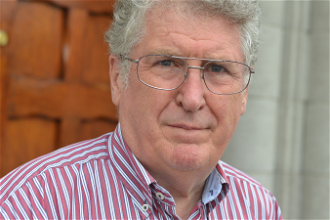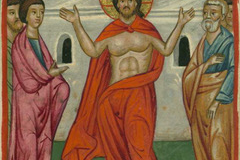Reflection on St Patrick: Missionary to the Irish

Fr Sean McDonagh
Much of what I learned in school about St Patrick has no basis in history. He did not come to Ireland in 432 AD, with papal approval to convert the Irish. We know from Prosper’s Chronicles that Palladius was ordained by Pope Celestine in 431 AD and was sent “as the first bishop, to the Irish who believe in Christ.” He probably arrived in Ireland in 432 AD.
Legend tells us that Patrick banished the snakes from Ireland. In fact, it was as a result of our island geography. Reptiles were not able to cross over the land bridge from Britain at the end of the last ice-age.
There is no historical evidence for the claim that St Patrick converted the High King of Ireland at Tara and used the shamrock as a catechetical tool to explain the doctrine of the Trinity to the king and his retinue. Finally, the parade which now is such a central element in current St Patrick’s Day celebrations around the world owes it origins to the Irish Americans in New York. According to The New York Gazette the first parade took place in 1756.
So, should we decommission St Patrick and send him into the saints’ limbo with Sts George, Philomena and Christopher? Not at all, St Patrick has left us two wonderful documents, his Confessio and his Letter to Coroticus. The issues which are discussed in those two documents are as relevant to the well-being of the Church in Ireland as they were when Patrick wrote them in the 5th century.
In order to understand the cultural journey which St Patrick undertook, it is important to situate him in his own historical milieu. He tells us in the first paragraph of his Confessio that his father, Calpornius, was a deacon and his grandfather, Potitus was a priest. His family were quite well off as they possessed a country seat. As he grew up, Patrick would have imbibed the attitudes of Roman citizens towards barbarians. Roman rule extended from the foothills of Scotland, through western European and North Africa over into Asia Minor and as far east and south as Persia. Roman citizens believed that their empire stood at the apex of human achievements. Despite the violence which was often used to extend the boundaries, Romans believed that their empire had brought peace and prosperity to the known world.
One of the great tools in achieving this flowering of human endeavour was the city of Rome itself and other Roman cities across the Empire. Barbarian did not have cities and they were regarded as being utterly depraved.
Many of the senior Church leaders in Briton, who were criticising Patrick’s mission among the Irish, would have felt the Irish needed to be civilised first by taking on the Roman values, before being Christianised.
In the very first line of the Confessio, which was written partly as a response to these charges, Patrick rejects this caricature and identifies himself with the Irish. He writes: ”I am Patrick, a sinner, most unlearned, the least of all faithful and utterly despised by many.” The Latin word which he uses is rusticissimus, which is the word Romans would have used to dismiss Barbarians. Even though Patrick was kidnapped and enslaved by Irish people, he did not see them as murderous barbarians. In fact, he was grateful for what happened, because it was during his times in Ireland that he recovered his faith and developed a prayer life which sustained him throughout the rest of his life.
In his writings Patrick refers to the Irish as the plebs Dei or the people of God. Their conversion has been so profound that “the sons and daughters of the kings of the Irish are seen to be monks and virgins.”
Patrick’s detractors accused him of not being worthy to be a missionary to the Irish. Rather than deny the charge, Patrick points to a similar criticism made about St Paul by the Corinthians (I Cor. 2: 1-5). Like Paul he came in weakness and did not use plausible words of wisdom, but he relied on the Holy Spirit, in order that their faith might not rest on human wisdom but on the power of God.
We thank God for that faith and I wish you beannachtaí Lá Fhéile Pádraig oraibh go léir (May the blessings of St Patrick’s Day be upon all of you).
Fr Sean McDonagh is a Columban missionary, based in Ireland.
See also today's story: St Patrick in his own words www.indcatholicnews.com/news.php?viewStory=20049
http://earthcaremission.wordpress.com





















